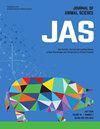Effects of Supplementation of Live and Heat-treated Bifidobacterium animalis subspecies lactis CECT 8145 on Glycemic and Insulinemic Response, Fecal Microbiota, Systemic Biomarkers of Inflammation, and White Blood Cell Gene Expression of Adult Dogs.
IF 2.7
2区 农林科学
Q1 AGRICULTURE, DAIRY & ANIMAL SCIENCE
引用次数: 0
Abstract
The popularity of functional ingredients such as probiotics and postbiotics has increased as pet owners seek ways to improve the health quality and longevity of their pets. Limited research has been conducted regarding the use of probiotics and postbiotics and their effects on canine health. The objective of this study was to evaluate the effects of daily supplementation of Bifidobacterium animalis subsp. lactis CECT 8145, in both live probiotic (PRO) and heat-treated postbiotic (POST) forms, on fecal fermentative end-products and microbiome, insulin sensitivity, serum gut hormones, oxidative stress, inflammatory biomarkers, and white blood cell gene expression of adult dogs. Eighteen adult beagles and 18 adult English pointers were used in a double-blinded placebo controlled parallel group design, with 12 animals per group (6 English pointers and 6 beagles). The study began with a 60 d adaptation period followed by a 90 d period of daily supplementation with either PRO, POST, or placebo (maltodextrin; CON). Longitudinal assessment of body weight (BW), body condition score (BCS), and pelvic circumference (PC) did not differ among dietary supplements (P > 0.05). Throughout the experimental period, fecal scores did not differ (P > 0.05), however, fecal pH was lower (P = 0.0049) in the dogs fed POST compared with CON. A higher fecal concentration of propionate (P = 0.043) was observed in dogs fed PRO and POST when compared with CON. While PRO and POST supplementation was associated with changes in bacterial composition at the family and genus level, the overall richness and diversity of the microbiome was not significantly affected. Functional analysis of the metagenome also suggests that PRO and POST supplementation induced potentially beneficial changes in the abundance of pathways involved in pathogenicity, amino acid biosynthesis and DNA repair. No differences in glycemic or insulinemic responses were observed among the groups (P > 0.05). Dogs supplemented with PRO had a higher (P < 0.05) mean white blood cell leptin relative fold gene expression compared with groups POST and CON. Serum metabolites and complete blood cells counts were within normal ranges and all dogs remained healthy throughout the study. Together, these data suggest that the PRO and POST can safely be supplemented for dogs. Moreover, the results of this study support further investigation of the role of PRO and POST in supporting parameters related to gut health and hormonal regulation.补充活的和热处理过的动物双歧杆菌亚种乳杆菌 CECT 8145 对成年犬血糖和胰岛素反应、粪便微生物群、全身炎症生物标志物和白细胞基因表达的影响
随着宠物主人想方设法提高宠物的健康质量和寿命,益生菌和后益生菌等功能性成分越来越受欢迎。关于益生菌和益后生菌的使用及其对犬健康的影响的研究还很有限。本研究旨在评估每天补充活益生菌(PRO)和热处理后益生菌(POST)形式的动物双歧杆菌亚种乳杆菌 CECT 8145 对成年犬粪便发酵终产物和微生物组、胰岛素敏感性、血清肠道激素、氧化应激、炎症生物标志物和白细胞基因表达的影响。研究采用双盲安慰剂对照平行分组设计,每组 12 只动物(6 只英国猎犬和 6 只比格犬),分别饲养 18 只成年比格犬和 18 只成年英国猎犬。研究以 60 天的适应期开始,随后 90 天内每天补充 PRO、POST 或安慰剂(麦芽糊精;CON)。对体重(BW)、体况评分(BCS)和骨盆周长(PC)的纵向评估结果显示,不同食物补充剂之间没有差异(P > 0.05)。在整个实验期间,狗的粪便评分没有差异(P > 0.05),但与 CON 相比,喂食 POST 的狗粪便 pH 值较低(P = 0.0049)。与喂养对照组相比,喂养PRO组和POST组的狗粪便中丙酸盐浓度更高(P = 0.043)。虽然PRO和POST补充剂与科、属一级的细菌组成变化有关,但微生物组的整体丰富度和多样性并未受到显著影响。对元基因组的功能分析还表明,PRO 和 POST 补充剂可能会诱导参与致病性、氨基酸生物合成和 DNA 修复的途径的丰度发生有益的变化。各组之间的血糖或胰岛素反应没有差异(P > 0.05)。与POST组和CON组相比,补充PRO的狗的平均白细胞瘦素相对折叠基因表达量更高(P < 0.05)。血清代谢物和全血细胞计数均在正常范围内,所有狗在整个研究期间都保持健康。这些数据表明,狗可以安全地补充 PRO 和 POST。此外,本研究结果还支持进一步调查 PRO 和 POST 在支持肠道健康和激素调节相关参数方面的作用。
本文章由计算机程序翻译,如有差异,请以英文原文为准。
求助全文
约1分钟内获得全文
求助全文
来源期刊

Journal of animal science
农林科学-奶制品与动物科学
CiteScore
4.80
自引率
12.10%
发文量
1589
审稿时长
3 months
期刊介绍:
The Journal of Animal Science (JAS) is the premier journal for animal science and serves as the leading source of new knowledge and perspective in this area. JAS publishes more than 500 fully reviewed research articles, invited reviews, technical notes, and letters to the editor each year.
Articles published in JAS encompass a broad range of research topics in animal production and fundamental aspects of genetics, nutrition, physiology, and preparation and utilization of animal products. Articles typically report research with beef cattle, companion animals, goats, horses, pigs, and sheep; however, studies involving other farm animals, aquatic and wildlife species, and laboratory animal species that address fundamental questions related to livestock and companion animal biology will be considered for publication.
 求助内容:
求助内容: 应助结果提醒方式:
应助结果提醒方式:


